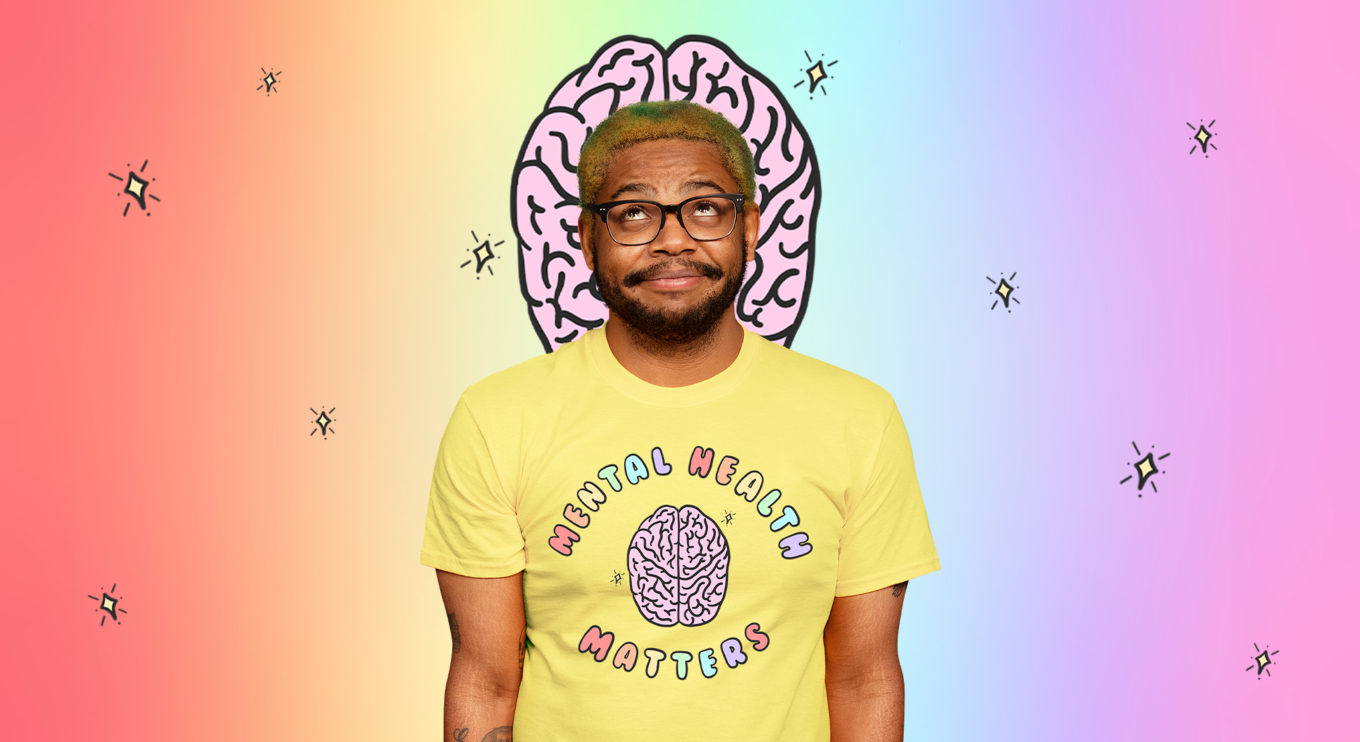It’s Mental Health Awareness Month. Before we get into ways to maintain mental health, I first want to talk about mental illness. I myself come from a family tree ripe with mental illness. You’ve got your depression over there, anxiety all up in here, spice it up with some schizoaffective disorder (that’s schizophrenia + bipolar or depression, for those aren’t hip with the lingo). My mom also worked in social services, helping those who were no longer at capacity to take care of themselves. I’ve also had friends, loved ones, and even coworkers share their own struggles with me.
I myself was diagnosed with anxiety and depression. There have been times in my life when all I wanted to do was curl up and rot in a suffocating nest of blankets and unwashed pajamas, with the shades closed, for days, letting the world go by. Mental illness ain’t cute. But I’ve gotten to a wonderful place now and can say it does get better, and, in a weird way, I was lucky to go through and experience it all.
For me, mental illness has always been not only very real, it was almost more normal than being neurotypical. I know it should not be cause for shame or stigma. But not everyone has had that kind of exposure. Some people don’t have a tangible understanding of mental illness. Some people suffer without acknowledging, or even realizing, that they’re struggling. And some people, bless them, don’t believe in mental illness. Which…kind of makes ya feel like a unicorn, right? Yes, I assure you, we’re very real.

Mental illness does not discriminate. It can affect any age, race, gender, culture, zip code, zodiac sign, shoe size—you get it. Mental illness can come from genetics or be triggered by life circumstances. It can be rooted in trauma or even caused by a brain injury. It can manifest temporarily or be a lifelong diagnosis. It’s something that affects us all. So, let’s not tiptoe around it or let it hide out in the taboo. It’s an illness, not a cringey high school yearbook photo. No need to hide it under the bed. We can, and should, get this topic out in the open.
I’m going to be real y’all. There is no magic wand. The process is long, slow, and full of ups and downs. Changing your brain is like changing the seasons. Patience, my friend. And maintaining mental health isn’t always bubble baths, high fives, and massages. It’s not like those weird slow-motion, white linen, frolicking beach commercials for tampons or whatever. Sometimes it’s uncomfortable. Sometimes it’s really boring. But you can take one step, then another, and someday, maybe months from now, you’ll look back and think, “I’ve come a long way.” So, let’s get into it. Here are some ways to maintain your mental health. As a bonus, some of the artist-made designs you’ll see benefit mental health charities as part of Threadless Causes.
1. Get your nutrition.

I know, I know. No one needs to hear “diet and exercise.” But hear me out. I believe nutrients aren’t just what you eat and drink. Nutrients come from literally everything you consume, with all your senses. So, while yes, eating fruits, veggies, and leafy things is a good way to nourish your brain, let’s push a little deeper than that.
First thing in the morning, are you consuming the sunrise, a stretch, a quiet coffee? Or are you already doom scrolling through Twitter? Throughout the day, are you giving your senses fresh air, natural light, and pleasant sights and smells? Are you pausing to mindfully pet the dog, smell the flowers? Take stock of what you consume in a day—the media, the sights, the smells, the textures—and then find little ways to nourish all your senses. Use your favorite plates. Light a candle. Wear fabrics that please you. Order your favorite meal and savor every little bite. Fill your space with art. Nourish not just your body, but your soul.
2. Move around.

Movement isn’t just gyms, treadmills, and soaking in sweat. When the goal is mental health, any movement that feels good will do. It can be a sport you play every weekend, or a favorite trail you revisit again and again. It can look like walking the dog, taking a swim, climbing a tree, or twerking for the mirror. Heck, for me, it was a weekend of clearing brush from the yard, repotting plants, and practicing a new dance move in the kitchen (side note: if anyone has any pointers on how to do that one TikTok dance where your butt—you know what, never mind, I’ll Google it). You can join a gym, sweep the house, or be the envy of your neighbors with a bounce-house obstacle course in your yard. You don’t need to subscribe to some cookie-cutter lifestyle that isn’t natural for you. Just find what fits and move.
3. Express yourself, without judgement or filters.

Self-expression is all about being in touch with what makes you, you. Maybe you’re a dancer or baker, or you make elaborate birdhouses. Maybe you’re a writer like yours truly, using the wordy words to feel through all the feelies. Or maybe you’re into working on cars, or painting miniatures, or collecting things you find in the woods and turning them into creepy wind chimes. You could be a doodler or a shower singer. Maybe you express yourself on the canvas or screen like the many incredible visual artists at Threadless. Maybe you express yourself with your style.
You don’t need to drop your day job and dive full-time into your passion for knitting mittens for snakes. (In fact, I highly recommend you don’t do that. For one thing, snakes are cold-blooded. Mittens would do nothing for them. For another, they literally don’t have hands.) But if you get in touch with your passions, it’ll help you stay true to yourself, and being true keeps you from feeling blue. (Wow, see, I’m so good with the wordy words. That rhymed and everything.) My point: express yourself.
4. Set boundaries.

This one’s hard because it can feel so backwards. We desperately want to feel connected to others, and often think by saying “Yes!” we’re being helpful. But you can’t pour from an empty cup. If you really want to help others, you need to know how to take care of yourself first. Don’t agree to tasks you don’t feel up to out of guilt. Don’t stretch yourself so thin you forget to take care of your own needs. The best way to help others is by making sure you’re not coming to them burnt out, irritable, and at the end of your rope. Learn to say, “Nope, I can’t.” If you have a history of people-pleasing and want to change, you can even spell it out explicitly:
“I know in the past I would’ve said yes, but I’m trying to set healthier boundaries, and this would cut into my necessary down time.”
And set boundaries with yourself too! It might look like not checking work emails after business hours, putting your phone away for a period of time, or unfollowing sources that don’t bring you peace of mind. It might look like leaving dirty dishes in the sink or laundry unfolded because you know what, you just checked in with yourself and realized what you really, truly need right now is a nap. Valid. Get your chill on.
5. Build up the bright side.

Did you know that in a marriage, it takes five positive interactions to cancel out the damage done by one negative interaction? That’s because humans naturally look to the negatives. Bad things are more memorable, and frankly, more interesting. It’s pretty rare to flip on the news and see, “BREAKING STORY! Healthy, happy family has a chill day at the pool. Timmy learned to do a handstand. More at 7 o’clock!”
Good days aren’t always shiny, obvious, Instagram-able, peak experiences. That means it’s our job to retrain our brain to recognize the good. So, pay attention. Take note. Use tools like gratitude journals or set out to take a picture of something that makes you smile every day. Whatever you gotta do to start retraining your brain to notice the good. It’s work at first, but slowly and surely, your brain will learn to look on the bright side.
These positive thoughts, moments, and memories are like antibodies, or white blood cells, defending your system from depressions. They’re there to fight for you when the bad days inevitably happen. When that voice in your head tries to say, “Everything’s bad! It’s all shit!” that positive mindset is there to pick that voice apart and say, “Well, that’s clearly not true. Look at all the good! It’s everywhere!”
6. Prioritize humor.

This one’s so simple but such a game changer. While we will never, ever laugh at mental illness, we sure as heck can find ways to laugh with it. Make humor a priority in your life. If you have to, put “Laugh” on your to-do list, do it. Seriously. Do it now. I’ll wait.
In any small way you can, incorporate humor into your life. Get goofy coffee mugs. Follow funny pages. Start your lazy weekend morning by listening to your favorite standup comedian. Have a couple silly t-shirts you can put on when you’re taking it all too seriously. Laughter is medicine people, so get your giggles in.
7. Be realistic.

Listen. There are going to be bad days. There are circumstances outside our control that can’t be avoided or self-cared away, like getting laid off, losing a loved one, or a gosh-darn pandemic. These days are like gremlins—evil, rude, and stinking worse than the dumpster behind a Fish & Eggs Buffet. (Those don’t exist…I hope.) The Worst Days of Your Life gremlins kick down your door, tear up the furniture, clog the toilet, pee on the rug, and just generally set about to ruin your life. They’re awful and no amount of happy thoughts and motivational posters will make those little shits go away. You’re going to have bad days. What can you do?
When those times arrive, I hold onto the mantra, “This will pass.” It’s so simple, but this mindset has seriously eased the pain. I know my moods, my circumstances, my life. They’re all temporary. For better or worse, everything changes. So, when the worst days arrive, I let the bad wash over me. When you just accept the feelings for what they are, they lose quite a bit of steam. The bad exists in context and can’t consume you.
When the Worst Day gremlins arrive, instead of trying to lock the doors or frantically do damage control, I just let them in. “Come on in. Sit right down. Can I make you some tea? No? Alright, tell me all your stupid little thoughts. Let me guess, you think I’m worthless and unlovable? You think I look weird and my friends hate me? Sure, sure, everything’s bad, yadda, yadda, very original. Don’t you have anything new to say?” The gremlins blink in surprise and start to twiddle their thumbs awkwardly. “Oh, uh, well I didn’t think I’d make it this far.” Then you sit together awkwardly, you and your worst days, and eventually the gremlins realize there’s not much left for them to wreck, so they might as well pack up and leave. They always do.
8. Help others.

I know I said earlier that there is no magic wand for mental health, but this comes pretty close. Lending a hand, selflessly, with no reward, is pretty much the abracadabra of mental health boosts. It’s not about putting your own struggle in perspective. This ain’t the struggle Olympics. ‘Round these parts we don’t compare pain or invalidate another person’s journey. It’s about that magical moment when humanity shines, when generosity wins, when kindness blooms. Whether it’s volunteering, donating, rescuing a puppy from traffic, or helping a stranger put away their cart at the grocery store. Big or small. Doing an honest good deed is the most surefire way to have a good day.
9. Do the work.

Mental health is work. It’s appointments, therapy, getting uncomfortable, and developing everyday habits. It’s work that takes time and patience, and has a cost. When you’re in a bad place, it’s easy to think, “It’s too much. I’m not worth it. I’m a burden.” Feel me reaching through the screen right now. C’mere, let me hold that sweet little face of yours. Hear my words. You’re so fuckin’ worth it. Because the truth is, it doesn’t matter how far you have to go and how hard it will be. The truth is that you and your mental health are worth every single second, every single penny, every single step of the way.
And it’s easy to let one step backwards convince you to give up. Maybe a medication doesn’t work, or the therapist isn’t a good fit. Maybe a diagnosis is elusive, or hell, maybe you can’t even afford to be seen. I’ve been there, friend. It’s exhausting. It sucks. That’s why you need a system of support, someone or something, a reason that reminds you to keep on truckin’. A friend. A family member. An online buddy. A furry friend. All that matters is that you keep on trying. Because no matter how bad it gets, there is always a path to healing. And you deserve to find that path. Pursuit of happiness, baby.
10. Get help.

Asking for help is one of the bravest things you can do. I have been there when someone finally found the courage to say, “I’m struggling and I can’t carry this burden alone anymore,” and lemme say, it’s the most badass thing I have ever seen. Your life is worth far too much to suffer in silence. I know there is stigma and how hard it is to outsmart your own brain when it’s fighting you. I know it’s scary as heck. But you deserve help. When it’s too much, don’t go it alone. Help is out there, so please, ask.
Everyone, and I mean everyone, struggles at some point and some level with their mental health. Whether you have a diagnosis or not, whether you’re thriving, barely functioning, or fighting your way through a crisis, you are not alone. Nothing you’re going through makes you alien from the rest of the human race. We’re all, very literally, in this together. Be patient and kind. Be the beautiful, magnificent, imperfect, goofball you were meant to be. I wish you all the happiness and health in the world. Happy Mental Health Awareness Month.
The design featured at the top of this post is “Mental Health Matters” by crystaldraws.




